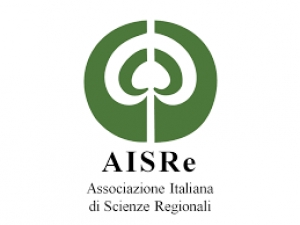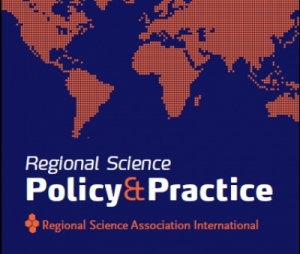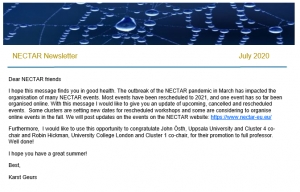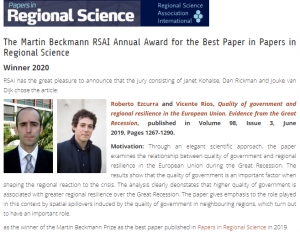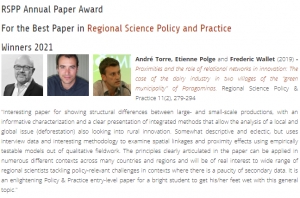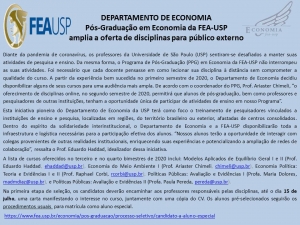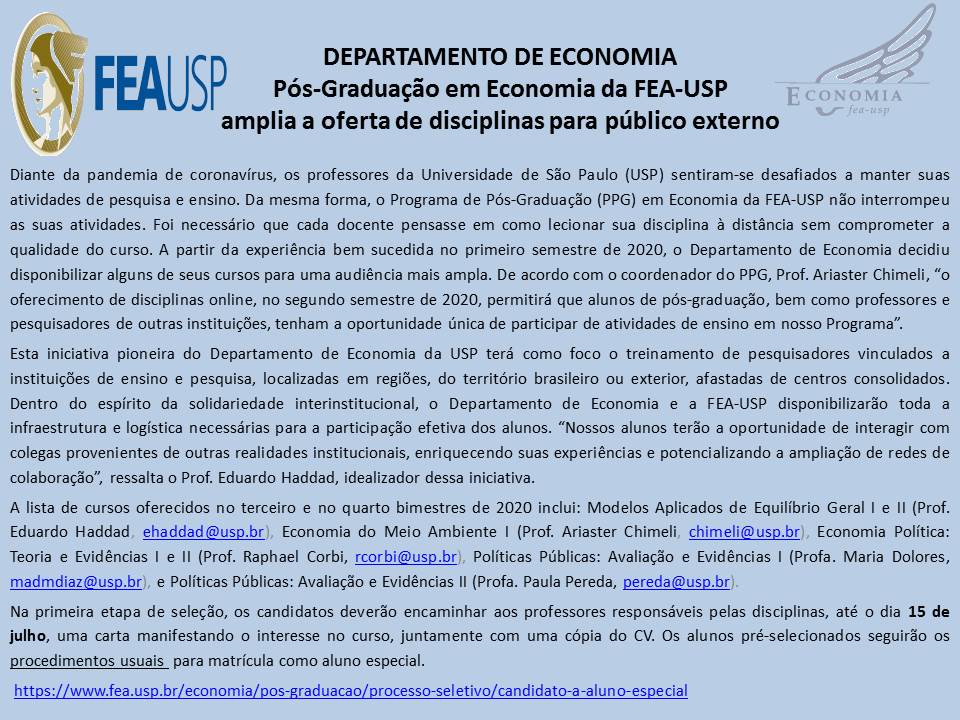Archives
Elisabete Martins
Forthcoming AISRe (Italian Section) Web conference!
In these days the website of the AISRe Web Conference has been activated (https://aisre20.wordpress.com/). There you can access the program, get access to the virtual classrooms and obtain information on how to join the conference.
The Scienze Regionali Lectio Magistralis, the plenary sessions on regional impacts of the COVID pandemic and the strategies for achieving sustainable development, and the one on “Great Minds in Regional Science” will be visible in streaming.
New RSPP article free online! "Regional Economic Impact of COVID‐19 in Colombia: An Input‐Output Approach"
"Regional Economic Impact of COVID‐19 in Colombia: An Input‐Output Approach", by Jaime Bonet‐Morón, Diana Ricciulli‐Marín,Gerson Javier Pérez‐Valbuen, Luis Armando Galvis‐Aponte, Eduardo A. Haddad, Inácio F. Araújo, and Fernando S. Perobelli. - https://rsaiconnect.onlinelibrary.wiley.com/doi/abs/10.1111/rsp3.12320
The aim of this paper is to assess the regional economic impact of the lockdown measures ordered by the national government to prevent the spread of COVID‐19. Using an input‐output model, we estimate the economic loss of extracting groups of formal and informal workers from different economic sectors. Results show monthly economic losses that represent between 0.5% and 6.1% of national GDP, depending on the scenario considered. Accommodation and food services, real estate, administrative services, construction and trade are the most affected sectors. Regionally, Antioquia, Boyacá, San Andrés, Santander and Valle del Cauca appear as highly vulnerable to these restrictions.
Post-doc proposal "quantitative assessment of the energy transition"
In the framework of the EU funded project TIPPING+ (Enabling Positive Tipping Points towards clean-energy transitions in Coal and Carbon Intensive Regions), the Paris School of Economics is recruiting a post-doctoral research fellow for 1 year (with possible extension for a second year).
The research fellow will be in charge of performing (i) an econometric assessment of the impact of climate policy in European Carbon Intensive Regions and (ii) a forward-looking analysis of the potential structural changes induced by these policies. The latter analysis will rely on the development of dynamic models of the European production network.
The candidate must have a very strong quantitative background with a PhD in applied mathematics, economics, or related field (operation research, physics, statistics). Furthermore, he/she must have a good understanding of current trends in the European climate policy landscape. Interested candidates should send a cover letter and a cv (including a publication list and the contact details of three referees) to This email address is being protected from spambots. You need JavaScript enabled to view it.
Applications will be reviewed until the position is filled.
RSPP Call for Papers | Special Issue on Space, Time and Political Economy (Extended deadline: May 1, 2021)
Call for papers | Special Issue on “Space, Time and Political Economy”
Extended deadline: May 1, 2021
Following the third encounter of the Portuguese Association of Political Economy (EcPol) held in January 30 – February 1, 2020, at Faculdade de Economia da Universidade do Porto and Católica Porto Business School and dedicated to the theme “Space, Time and Political Economy”, we are hereby inviting contributions to the special issue of Regional Science Policy & Practice.
Regional Science Policy & Practice (RSPP) is the official policy and practitioner oriented journal of the Regional Science Association International. It is an international journal that publishes high quality papers in applied regional science that explore policy and practice issues in regional and local development. It welcomes papers from a range of academic disciplines and practitioners including planning, public policy, geography, economics and environmental science and related fields. More information about the journal can be found at:
https://rsaiconnect.onlinelibrary.wiley.com/hub/journal/17577802/homepage/productinformation
We welcome to this special issue contributions that study the economy in the context of a transdisciplinary study of human action. The economy is a concrete reality situated in a geographical and historical context. The various spatio-temporal contexts produce a diversity and cultural wealth that cannot be fully understood outside a transdisciplinary perspective that encompasses not only contributions from the various social sciences, but also the natural sciences, which help us to understand the material conditions of each territory.
Articles are accepted in the following topics, amongst others:
The economy and its geographical, historical and political contexts;
Economic institutions in space;
Social and spatial distribution, equality and reciprocity;
The multiple (temporal and geographical) scales of economies;
Economic ideas and policies for territorial change;
The territory and innovation / the territory and tradition;
Territorial aspects of inequality;
The political economy of space and time in capitalism and socialism.
Submissions should be made through the journal’s platform at:
https://mc.manuscriptcentral.com/rspp
Submissions should clearly state the special issue to which they are submitted. The length of the submissions should not exceed 6,000 words including abstract and footnotes and they should be written in English. Further information on the submission guidelines can be found at:
https://rsaiconnect.onlinelibrary.wiley.com/hub/journal/17577802/homepage/forauthors
Extended submission deadline: May 1, 2021
Any further queries on this special issue can be sent to the guest editors:
Francisca Guedes de Oliveira (Católica Porto Business School and CEGE): This email address is being protected from spambots. You need JavaScript enabled to view it.
Gonçalo Marcelo (CECH, Univ. de Coimbra / Católica Porto Business School): This email address is being protected from spambots. You need JavaScript enabled to view it.
Nuno Martins (Católica Porto Business School and CEGE): This email address is being protected from spambots. You need JavaScript enabled to view it.
Winner of the 2020 Peter Nijkamp award
Yi Niu, from Capital University of Economics and Business, Bejing, China, received the 2020 Peter Nijkamp RSAI Research Encouragement Award for an Mid-Career Scholar from a Developing Country.
Congratulations!
The Award recognizes the outstanding potential of an mid-career researcher from a nation in the developing world and in which there is a formal Section of RSAI, and seeks to encourage the development of the early career scholar as a high quality researcher in the field of Regional Science and as a participant in the international Regional Science community.
NECTAR Newsletter summer 2020
|
|||||||||||||||||||
|
Postponed Workshops and Special Sessions The Western regional science (WRSA) March 18-21, 2020 Hawaii USA was cancelled, including the CL5 special session Regional Science and Tourism. WSRA will be combined with NARSC, November 11-14, 2020, in San Diego. NECTAR Clusters 5 (Leisure, Recreation and Tourism) and 6 (Accessibility) are organising a NECTAR special session at NARSC on Regional Science and Tourism in the Era of Global Uncertainty. A call for paper has been distributed already. A Cluster 5 Special Session “ICT, Transport and Tourism” was to be organised at the June Regional Science Association World Congress in Marrakech. RSAI was postponed and is considering multiple future options, including holding the World Congress in Morocco in May 2021. A Cluster 6 Special session “Accessibility and Quality of Life” at the World Society for Transport and Land Use Research (WSTLUR) Conference hosted by Portland State University, USA, has been postponed from July 2020 to August 2021. NECTAR Cluster 3 (Logistics and Freight) workshop on “Intermodality and synchromodality in the European Modular System”, organized by University of Zaragoza and planned for June 4-5 2020, will be postponed to June 3-4 2021. NECTAR Cluster 5 workshop “Policies and Strategies in Sustainable Tourism”, hosted by BBW University of Applied Sciences, Berlin, planned for 18th & 19th of June, will be postponed to end June – early July 2021. The final date will be announced soon. The NECTAR Cluster 6 (Accessibility) and Cluster 4 (Travel, Migration, Housing and Labour Markets), together with the Joint Research Centre (JRC) are organizing a joint workshop “Challenges for Transport and Accessibility Policy: New Data Sources and Mobility Options”. The meeting was planned for 1- 2 October 2020 in Seville, Spain, and is rescheduled to early October 2021. Cancelled NECTAR workshop The NECTAR cluster workshop “Social and Health Implications of Active Travel Policies” originally planned for 26-27 March at the University of Venice was rescheduled to October 15-16, 2020, but given the uncertainty of the pandemic the decision has been made to cancel the workshop. The ambition is to organise a new NECTAR event in Venice in 2022. 2021 NECTAR International Conference Given the uncertainty of the global COVID pandemic, we decided to postpone the biennial NECTAR conference hosted by the University of Toronto to November 7-9, 2021. This is in the same week as the NARSC 2021 conference in Denver (Colorado), organized Nov 10-13, 2021. This allows NECTAR members to combine both conferences in one trip. Workshop Report Cluster 8 co-chairs Tuuli Toivonen and Luc Wismans organised a NECTAR special session at Mobile Tartu Conference in Estonia on Mobile phones, travel and transportation. The conference was organised online June 30, 2020. More than 240 participants from 48 countries registered. The special session comprises 5 online presentations. Mobile Tartu 2020 Virtual Conference playback is available at www.worksup.com (enter an event id: MOBILETARTU2020). Schedule NECTAR Events November 11-14, 2020, special session(s) on “Tourism and Regional Science in the Era of Global Uncertainty, 2020 North American Regional Science Council (NARSC) in San Diego, CA June 3-4 2021, NECTAR Cluster 3 (Logistics and Freight) workshop on “Intermodality and synchromodality in the European Modular System”, organized by University of Zaragoza Aug. 9-13, 2021. Cluster 6 Special session “Accessibility and Quality of Life” at the World Society for Transport and Land Use Research (WSTLUR) Conference hosted by Portland State University, USA, Nov 7-9, 2021, biennial NECTAR conference, the University of Toronto, Canada |
|||||||||||||||||||
Winner 2020 - Martin Beckmann Annual Award for the best paper published in Papers in Regional Science in 2019

The Martin Beckmann RSAI Annual Award for the Best Paper in Papers in Regional Science
Winner 2020
RSAI has the great pleasure to announce that the jury consisting of Janet Kohlhase, Dan Rickman and Jouke van Dijk chose the article:

 Roberto Ezcurra and Vicente Rios, Quality of government and regional resilience in the European Union. Evidence from the Great Recession, published in Volume 98, Issue 3, June 2019, Pages 1267-1290.
Roberto Ezcurra and Vicente Rios, Quality of government and regional resilience in the European Union. Evidence from the Great Recession, published in Volume 98, Issue 3, June 2019, Pages 1267-1290.
Motivation: Through an elegant scientific approach, the paper examines the relationship between quality of government and regional resilience in the European Union during the Great Recession. The results show that the quality of government is an important factor when shaping the regional reaction to the crisis. The analysis clearly deonstates that higher quality of government is associated with greater regional resilience over the Great Recession. The paper gives emphasis to the role played in this context by spatial spillovers induced by the quality of government in neighbouring regions, which turn out to have an important role.
as the winner of the Martin Beckmann Prize as the best paper published in Papers in Regional Science in 2019.
Winner 2021 RSPP Annual Paper Award For the Best Paper in Regional Science Policy and Practice published in 2019
RSPP Paper 2021 Award (related to papers published in 2019)
RSPP Annual Paper Award
For the Best Paper in Regional Science Policy and Practice
Winners 2021


 André Torre, Etienne Polge and Frederic Wallet (2019) - Proximities and the role of relational networks in innovation: The case of the dairy industry in two villages of the “green municipality” of Paragominas. Regional Science Policy & Practice 11(2), 279-294
André Torre, Etienne Polge and Frederic Wallet (2019) - Proximities and the role of relational networks in innovation: The case of the dairy industry in two villages of the “green municipality” of Paragominas. Regional Science Policy & Practice 11(2), 279-294
"Interesting paper for showing structural differences between large- and small-scale productions, with an informative characterization and a clear presentation of integrated methods that allow the analysis of a local and global issue (deforestation) also looking into rural innovation. Somewhat descriptive and eclectic, but uses interview data and interesting methodology to examine spatial linkages and proximity effects using empirically testable models out of qualitative fieldwork. The principles clearly articulated in the paper can be applied in numerous different contexts across many countries and regions and will be of real interest to wide range of regional scientists tackling policy-relevant challenges in contexts where there is a paucity of secondary data. It is an enlightening Policy & Practice entry-level paper for a bright student to get his/her feet wet with this general topic."
The winner paper is free on-line until the end of August - https://rsaiconnect.onlinelibrary.wiley.com/doi/full/10.1111/rsp3.12151
The ERSA Web Conference | Spatial Challenges for the New World, 25-27 August, 2020
 Dear Members, Dear Colleagues,
Dear Members, Dear Colleagues,
- Keynote Speeches
- Roundtable on Covid-19 with proven scholars and experts
- Parallel Sessions : Special Session topics, General topics
- Young Scientists' Sessions
- Online Networking breaks
- more opportunities
An extraordinary Speakers' Line up including Pierre-Alexandre Balland, Simin Davoudi, Mafini Dosso, Raquel Ortega-Argilès, Daniel M. Sturm and Hans Westlund more
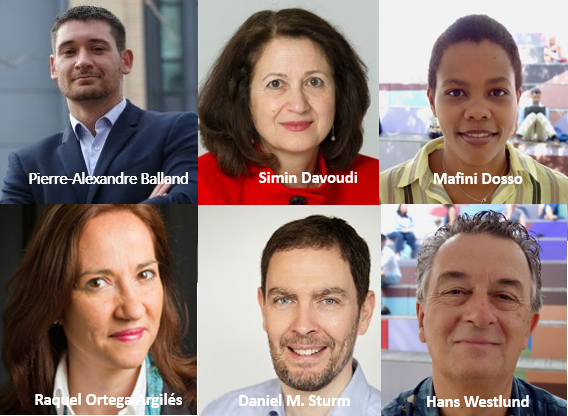
- Detailed programme available by July 15th
- Registration for attendees to start on July 20th

OFERTA DE CURSOS ONLINE DA PÓS-GRADUAÇÃO EM ECONOMIA - FEA-USP PARA PÚBLICO EXTERNO
About Us
The Regional Science Association International (RSAI), founded in 1954, is an international community of scholars interested in the regional impacts of national or global processes of economic and social change.

